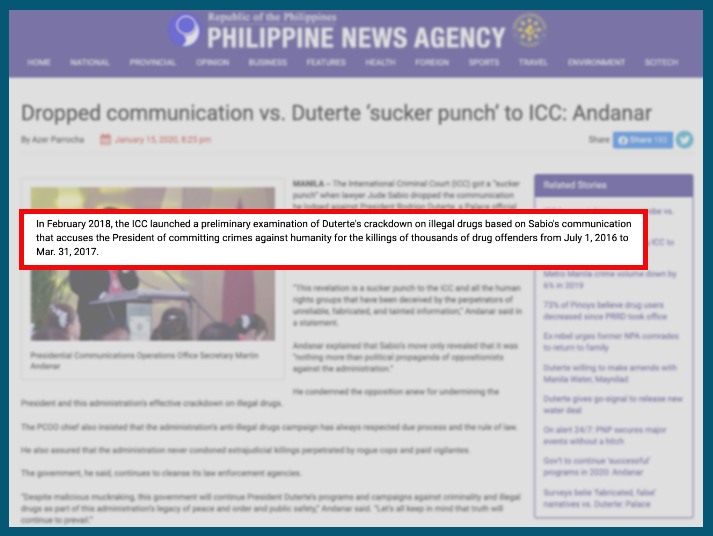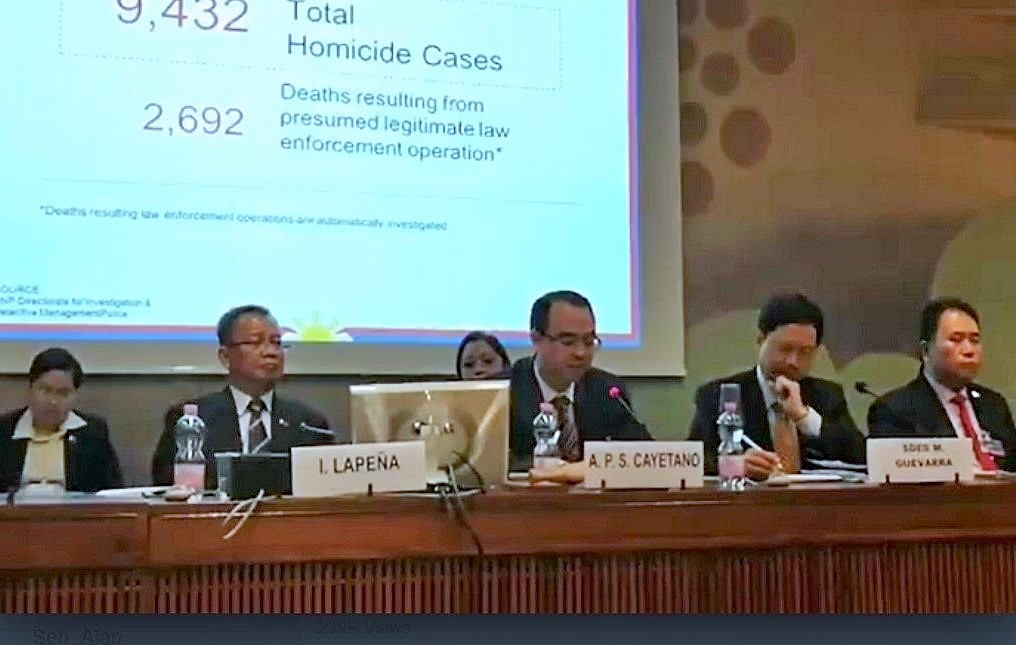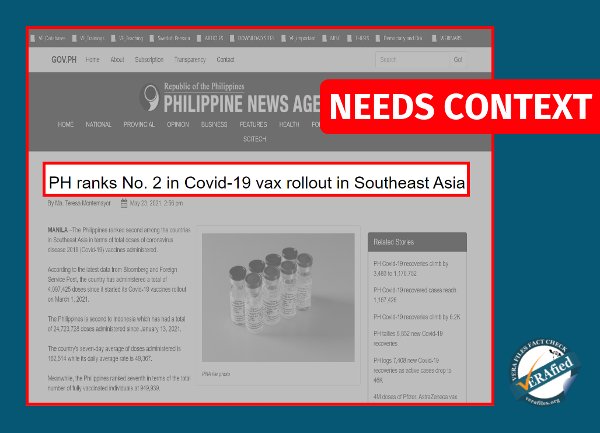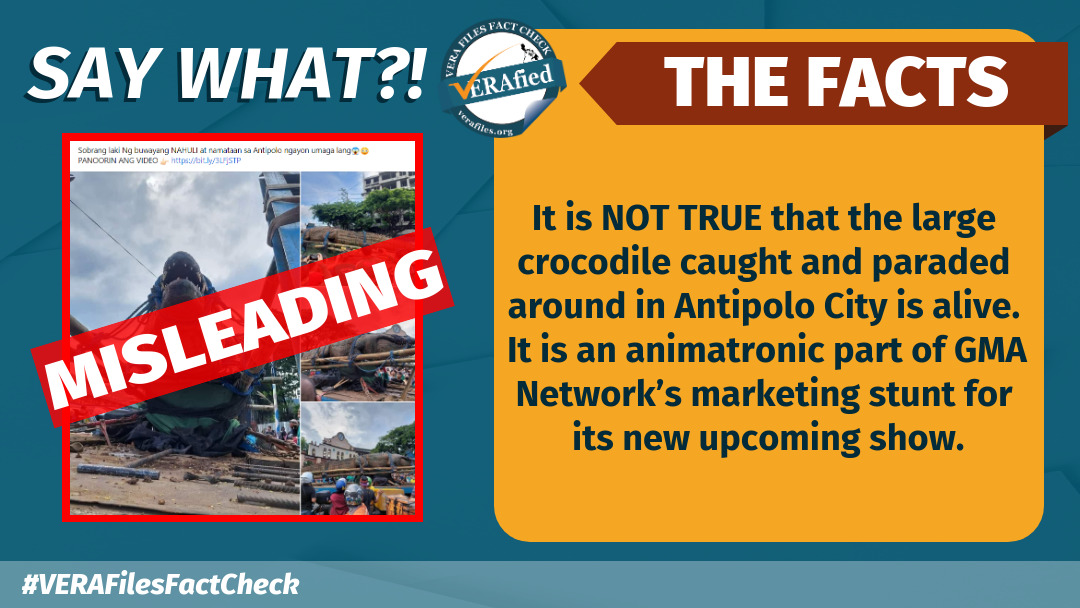The Philippine News Agency (PNA), a State-run “web-based newswire service,” misled readers when it claimed the International Criminal Court’s (ICC) ongoing preliminary examination on the Duterte government’s drug war is “based” on information provided by lawyer Jude Sabio.
STATEMENT
In a report on Jan. 15, a day after Sabio said he intended to withdraw his ICC communication against President Rodrigo Duterte, among others, the PNA wrote:
“In February 2018, the ICC launched a preliminary examination of Duterte’s crackdown on illegal drugs based on Sabio’s communication that accuses the President of committing crimes against humanity for the killings of thousands of drug offenders from July 1, 2016 to Mar. 31, 2017.”
Source: Philippine News Agency, Dropped communication vs. Duterte ‘sucker punch’ to ICC: Andanar, Jan. 15, 2020
Sabio formerly represented hitman-turned-witness Edgar Matobato, who linked Duterte to the Davao Death Squad, or DDS, back when the latter was still Davao City mayor for over 22 years.
In an affidavit signed Jan. 14 stating his intent to withdraw his ICC submission, the lawyer said the document was merely “political propaganda” of the opposition.
FACT
The court’s preliminary examination on alleged crimes against humanity committed under the government’s war against illegal drugs was based on a “number of communications and reports,” not just on Sabio’s submission alone.
In its 2019 report, the ICC prosecutor’s office, headed by Fatou Bensouda, said it “gathered, received, and analyzed information from a wide range of sources.” Aside from communications, such as Sabio’s, the office:
“…reviewed hundreds of media and academic articles, reports, databases, legal submissions, primary documents, press releases and public statements by intergovernmental, governmental and non-governmental organizations, and other relevant sources.”
Source: International Criminal Court, Report on Preliminary Examination Activities 2019, Dec. 5, 2019
Moreover, Bensouda’s office has been “aware” of the “worrying reported extra-judicial killings of alleged drug dealers” in the Philippines since October 2016. Back then, the prosecutor had already warned that her office will be “closely” monitoring the situation in the country and:
“…record any instance of incitement or resort to violence with a view to assessing whether a preliminary examination into the situation of the Philippines needs to be opened.”
Source: International Criminal Court, Statement of the Prosecutor of the International Criminal Court, Fatou Bensouda concerning the situation in the Republic of the Philippines, Oct. 13, 2016
Sabio submitted his 77-page communication on April 24, 2017. The document dealt extensively on Duterte’s alleged involvement in the DDS, and also included the bloody drug war under the Duterte presidency. (See VERA FILES FACT CHECK: Can Duterte invoke territoriality on matters related to crimes specified in the Rome Statute?)
Bensouda initiated the preliminary examination on the Philippines almost 10 months later, on Feb. 8, 2018.
The ICC prosecutor’s office in a 2018 report said it has so far received 52 communications pertaining to the Duterte government’s drug war. These came from different groups and individuals, including the families of victims.
The PNA report also incorrectly stated the period being looked into by the ICC, leaving out almost two whole years. The court’s preliminary examination spans from July 1, 2016 up to March 16, 2019 — not just until March 31, 2017 — the day before the Philippines’ withdrawal from the Rome Statute, the agreement which created the ICC, took effect.
This means any information on relevant crimes allegedly committed by Duterte and other officials within that period will be considered by Bensouda’s office in deciding whether or not to seek authorization to pursue an investigation. (See VERA FILES FACT SHEET: ICC’s preliminary examination update on drug war, explained)
Based in The Hague, Netherlands, the ICC is an independent institution that investigates, prosecutes, and tries individuals accused of committing genocide, crimes against humanity, war crimes, and crimes of aggression.
The Philippines was among the 120 countries that voted in favor of the treaty (thus, establishing the court) back in 1998. It officially entered into force in the country on Nov. 11, 2011. (VERA FILES FACT CHECK: Duterte claims the PH was ‘not ever’ a member of the ICC. Is that so?)
The Duterte government initiated its withdrawal from the treaty on March 17, 2018, a month after Bensouda launched a preliminary examination into the administration’s drug war.




